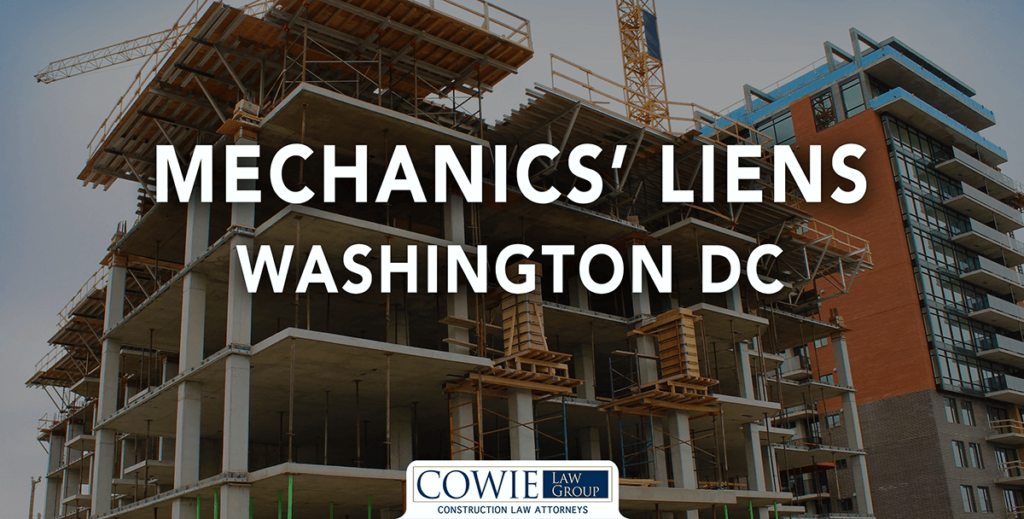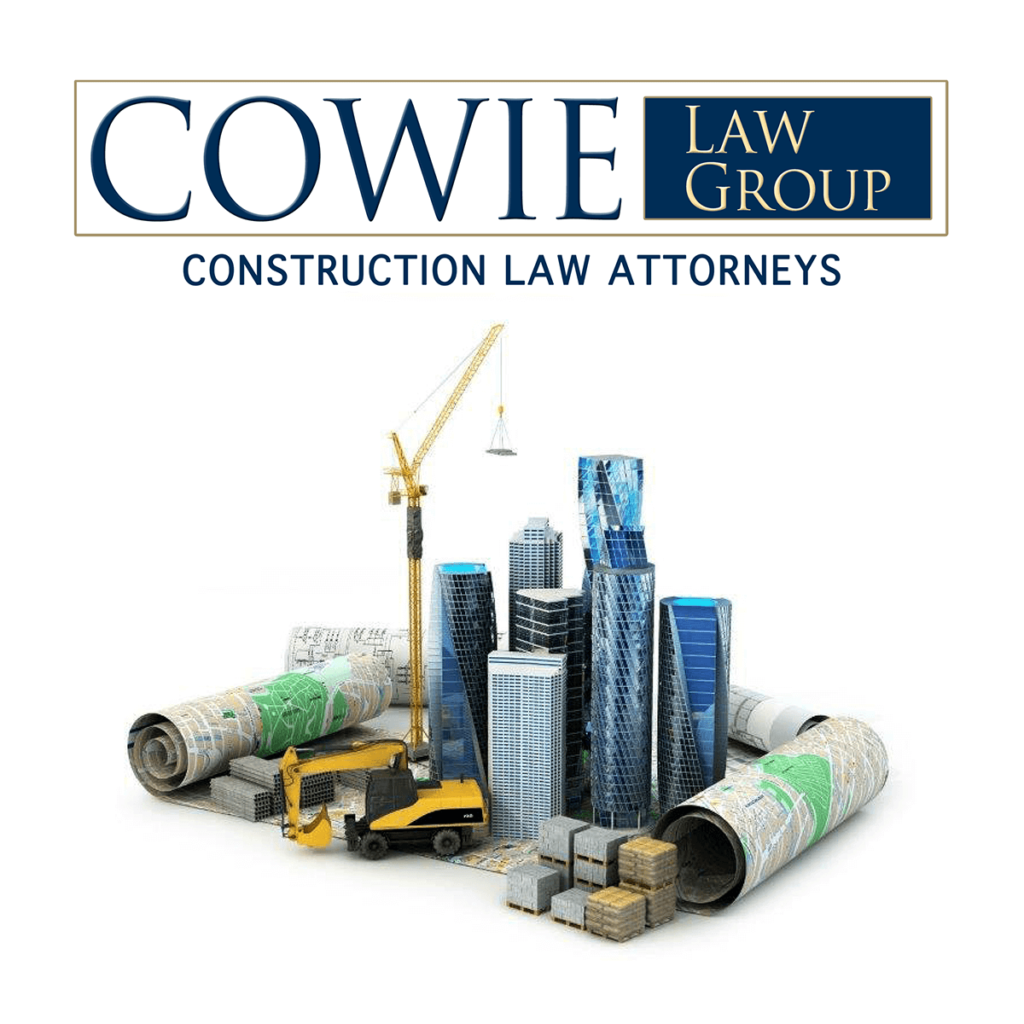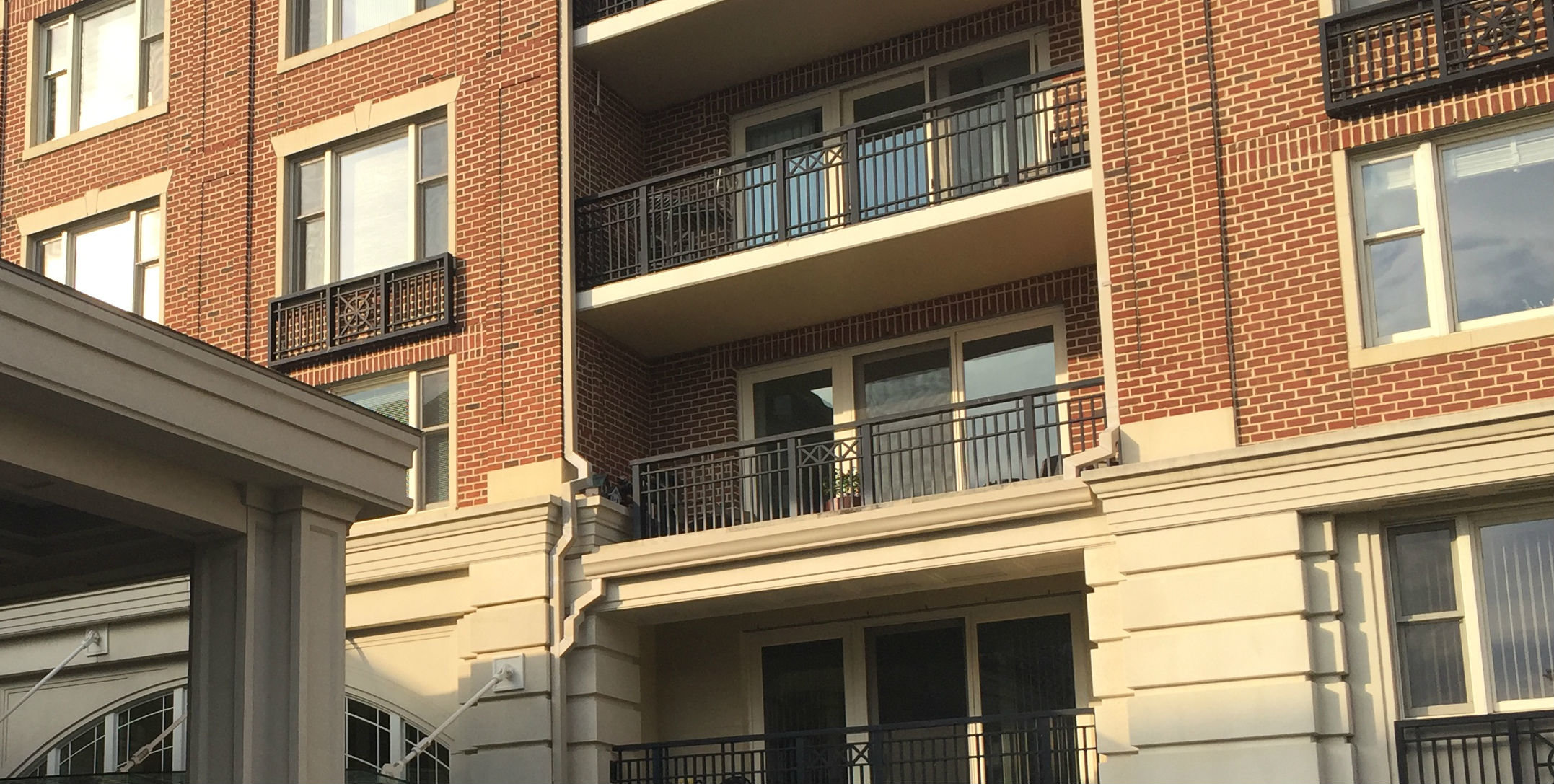
District of Columbia Mechanic’s Lien Law in A Nutshell
The District of Columbia Mechanic’s Lien statute provides general contractors and some subcontractors with a powerful statutory remedy to recover monies owed for work or material supplied in the construction, improvement or repair of a building located in the District of Columbia.
A District of Columbia mechanic’s lien claim, if properly enforced pursuant to the statute, results in the establishment of a lien against the owner’s real property where the unpaid construction work and materials were provided. The lien attaches to the land and buildings thereon and can be used to force a sale of the owner’s interest therein as a source of monetary funds to satisfy the amount due. Subject to exceptions discussed below, the lien amount equals the unpaid amount owed under the contract, or if no written contract, the reasonable value of the unpaid portion of the project at issue.
A mechanic’s lien claim against an owner’s property is not the sole remedy for non-payment of construction services and/or materials provided in the District of Columbia. General contractors and subcontractors may simultaneously pursue any other legal claims they may have such as breach of contract against the owner or other contractors on the project.
The advantage of a District of Columbia mechanic’s lien claim is the immediate legal establishment of a lien by the mere filing of the appropriate papers. The lien encumbers the owner’s property which acts as powerful leverage motiving expedient payment as a precondition to having the lien removed. A breach of contract claim, on the other hand, results only in a legal judgement against a defendant (not its property) after pursuing legal proceedings and ultimately succeeding at trial or arbitration. The resulting judgement must then be enforced against the defendant’s property through and entirely new legal process
The History and Rationale for the District of Columbia Mechanic’s Lien Law
The original rationale in this country for adopting a mechanic’s lien law was to encourage builders in the 1790’s to become involved in the construction of the new capital of the United States (later called “Washington” after President George Washington) located within the newly created “the District of Columbia”, now generally referred to as “Washington DC”.
On July 9, 1790, the first United States Congress passed the so called “Residence Act” approving the creation of a capital along the Potomac River within a “district of territory” to be selected by then President George Washington. The Act was officially titled “An Act for Establishing the Temporary and Permanent Seat of the Government of the United States.” Shortly thereafter, in 1791, the State of Maryland, which, at that time, included the area where Washington DC is now located, passed the first Mechanics’ Lien Act in this country. The legislation was introduced in the Maryland Legislature by Thomas Jefferson and would apply in the District of Columbia on the Marland side of the Potomac because the Residence Act specified that the law of Maryland would remain in effect within the portions of newly created portion District of Columbia carved out of Maryland, “until Congress shall otherwise by law provide.” See “Mechanics’ Liens in Maryland” by Nicholas D. Cowie For an article discussing current mechanics’ lien law in the state of Maryland.
At the time Thomas Jefferson introduced the mechanic’s lien legislation there were no automobiles and the term “mechanic” generally referred to builders and skilled tradesmen such as masons and carpenters. The federal government’s credit was not as good back then as it is today. Therefore, creating a law that would allow for the establishment of a lien on a building under construction was, and still is, a means of offering security to the contractors and subcontractors who provide labor and materials prior to payment.
Who Can Assert a District of Columbia Mechanic’s Lien Claim: “Contractors”, “Subcontractors” and “Sub-subcontractors”?
Under the District of Columbia mechanic’s lien law, the term “contractor” means the contractor who has a direct contract with the property owner to perform or supply the construction work, materials, repairs or other improvements in question. DC Code §40–301.01. This is the entity who would in common parlance be referred to as the “general contractor” who, in turn, may enter into subcontracts with other trades (e.g., masons, electricians, HVAC contractors, etc.) as necessary to complete to work. The term “subcontractor,” as used herein, refers to any person “directly employed by” the owner’s contractor, such as a subcontractor, material supplier, or laborer. DC Code §40–303.01.
Only contractors (those who contract directly with the owner) and subcontractors (those who contract directly with an owners’ contractor) are entitled to seek a mechanic’s lien under the District of Columbia mechanic’s lien law. DC Code §§40–301.01 and 40–303.01. Sub-subcontractors (those subcontractors who are not in direct contractual privity with the owner’s contractor) do not have lien rights under the Washington DC mechanic’s lien law. DC Code §40–303.01.
Attachment and Preservation of a District of Columbia Mechanic’s Lien
A District of Columbia mechanic’s lien attaches at the time of the commencement of the construction of the building. This early commencement date gives a District of Columbia mechanic’s lien priority in time over many types of subsequently created liens that attached to the property. DC Code §40-301.01. For example, a lien arising out of the recording of a judgment or a second mortgage occurring after construction or renovation of the building was commenced would not have priority over a properly enforced a District of Columbia mechanic’s lien. However, the mechanic’s lien will terminate unless there is timely compliance with the requirements of the District of Columbia mechanic’s lien law discussed below, including filing of a notice of intent to enforce a mechanic’s lien followed by the filing of a lawsuit to enforce the mechanic’s lien, if necessary. In many cases, the mere filing of a timely notice of intent to enforce a mechanic’s lien will result in a settlement of the payment dispute without the contractor or subcontractor ever having to file of a lawsuit to enforce the mechanic’s lien.
Notice of Intent to Enforce a District of Columbia Mechanic’s Lien – 90 days
Requirements for contractors and subcontractors
A notice of intent to enforce mechanic’s lien must be filed and recorded with the Recorder of Deeds of the District of Columbia no later than 90 days after the completion or termination of the project, whichever occurs earlier. DC Code §40-301.02(a)(1). The notice must identify the property subject to the lien and the amount due as well as contain the specified information and documentation required by the Washington DC mechanics’ lien law as set forth in Section 40-301.02(b) of the District of Columbia Code [https://code.dccouncil.us/dc/council/code/sections/40-301.02.html]. The Recorder of Deeds office publishes a form for this purpose called “Notice of Mechanic’s Lien.” Failure to timely record the notice will result in the termination of lien rights. DC Code §40-301.02(a)(1).
Additionally, within five (5) business days after recording the notice of intent, a copy must be sent by certified mail to the owner of the property. DC Code §40-301.02(a)(2). If the certified mail is returned unclaimed or undelivered, a copy of the recorded notice of mechanic’s lien must be posted on the property in a location generally visible from an entry point. DC Code §40-301.02(a)(2).
Additional Delivery Requirement for subcontractors
In addition to certified mail delivery discussed above, subcontractors must also serve an additional notice of intent to enforce mechanic’s lien on the owner by leaving a copy thereof with said owner or his agent, if said owner or agent is a resident of the District, or if neither can be found, by posting the [notice] on the premises.” DC Code §40-303.03. An owner typically has no communication with subcontractors; so presumably, this additional form of delivery is to ensure the owner gets notice of its contractor’s failure to pay a subcontractor.
Be Specific in Notice of Intent to File Mechanics’ Lien Documentation
The notice of intent to enforce mechanic’s lien must contain specific information and documentation as specified in the District of Columbia Mechanic’s Lien Law. A notice of intent is “void” if it does not contain the information specified by the Washington DC Mechanic’s Lien Act. DC Code §40-301.02(a)(1). Failure to timely include all the require information and documentation can prevent a contractor or subcontractor from obtaining a lien. DC Code §40-301.02(a)(1).
Owner’s Defense of Payment Before Receipt of Subcontractor Notice
Until the property owner receives the required written notice that a subcontractor has not been paid (i.e., the subcontractor’s notice of intent to enforce mechanic’s lien), the owner can make payments to its contractor and rely upon the “defense of payment” to defeat a subcontractor’s mechanic’s lien claim. DC Code §40-303.02 and §40-303.03. For example, if prior to receiving a subcontractor’s notice of intent, the owner has already paid the contractor in full (and the amount of payment is not disputed), then the subcontractor is not entitled to a mechanic’s lien on the property. DC Code §40-303.02. Therefore, an unpaid subcontractor will typically want to provide the owner with the required notice as soon as possible while monies are still owed to the contractor.
Owner’s Duty to Withhold Payment After Receipt of Subcontractor’s Notice
Once the subcontractor provides the owner with required notice of intent to file mechanic’s lien, the owner has a duty to withhold payments owed the contractor in an amount sufficient to satisfy the contractor’s debts to the subcontractor. DC Code §40-303.04. Thereafter, the property will be subject to a subcontractor mechanic’s lien up to the amount still owed the contractor at the time the owner received the subcontractor’s notice. DC Code §40-303.04. Payments made to the contractor by the owner after its receipt of the subcontractor’s notice of intent may be deemed to have been made in bad faith. DC Code §40-303.03(b).
Suit to Enforce Mechanic’s Lien (180 days) and Notice of Pendency (190 days)
In order to enforce a District of Columbia mechanic’s lien, a contractor or subcontractor must also file a lawsuit seeking to enforce the mechanic’s lien in court within 180 days after the date that the Notice of Intent to Enforce Mechanic’s Lien was recorded in the office of the Recorder of Deeds. DC Code §40-303.08 and 40-303.13(a)(1)(A). Additionally, a notice of pendency of the lawsuit (in latin: “lis pendens”) must be recorded in the land records office within 10 days of filing suit in order to put third parties on constructive notice that the property is the subject of a lawsuit to enforce a mechanic’s lien. DC Code §40-303.13(a)(1)(B). A lis pendens will show up in a title search, thereby notifying perspective purchasers prior to settling on the property. Requirements for filing a Notice of Pendency of Action are set forth DC Code §42-1207. The failure to timely file the lawsuit and record a notice of pendency of action will cause the lien to terminate. DC Code §40-303.13(a)(2). The lawsuit, also referred to as a “bill in equity,” must contain specific allegations as set forth in the Washington DC Mechanic’s Lien law. DC Code §40-303.08.
Subcontractors take Subject to Contractual Defenses in the Owner-Contractor Agreement
A subcontractor’s District of Columbia mechanic’s lien claim is subject to defenses that the owner has against the contractor under the terms and conditions of the owners contract with the contractor. DC Code §40-303.02(a). As such, a subcontractor’s mechanic’s lien claim against an owner’s property is generally only as strong as the rights of the contractor against the owner. A contractor, however, cannot agree with the owner to waive a subcontractor’s right to make a mechanic’s lien claim. DC Code §40-303.02(a). Thus, in defending against a subcontractor’s mechanic’s lien claim, an owner cannot defend the claim by relying on a contractual provision whereby the contractor agrees to waive its subcontractor’s right to bring a mechanic’s lien claim. Likewise, an owner cannot rely upon a “pay if paid” or “pay when paid” clause as a defense to a mechanics lien claim. See article by Nicholas D Cowie on “Pay if Paid” and “Pay when Paid” clauses and how they affect subcontractor payment claims in Maryland and Washington DC: https://cowielawgroup.com/subcontractor-%EF%BB%BFpay-if-paid-pay-when-paid-clauses-maryland-washington-dc-prevention-doctrine-mechanics-liens-payment-bonds-little-miller-act-claims/
Subcontractor’s Right to Know Contract Terms
Subcontractors have a right to demand that an owner provide a statement of the terms of the contract between the owner and the contractor and the amount due thereunder. DC Code §40-303.05. This demand can be made by the subcontractor at the same time it provides the owner with the notice of intent to file mechanic’s lien. Failure of the owner to respond to such a demand can result in liability to the owner for payments made to the contractor after receipt of the demand. DC Code §40-303.05.
Mechanic’s Lien Waivers Following Completion of Work
A contractor may waive its mechanic’s lien rights in a construction contract with the owner. However, under the Washington DC mechanic’s lien law, a waiver of liens in the contract between the owner and the contractor is not effective against a subcontractor. DC Code §40-303.02(a).
An owner can, however, require a contractor to obtain signed mechanic’s lien releases from all subcontractors and material suppliers on a project for work performed and materials provided. These releases can be made part of the contract or obtained upon completion of the subcontractor’s work or provision of materials, or a portion thereof, and, in either case, will provide some assurance that payment was made and protect owners and contractors from subcontractor mechanic’s lien claims.
Decree of Sale
If the lawsuit establishes that the contractor or subcontractor is entitled to enforce a mechanic’s lien, the court will issue a decree of sale of the land and premises of the owner to satisfy the lien. DC Code §40-303.09.
Deficiency Judgment
If the proceeds from the sale of the property subject to the lien is insufficient to satisfy the lien amount, the court may enter a personal judgment against the owner or general contractor for the balance of the lien amount. The personal judgment in favor of the mechanics’ lien claimant will be against the party who contracted for labor and materials furnished, either the owner and/or owner’s contractor as the case may be. §40-303.20.
Mechanic’s Lien Undertaking “Bonding Off the Lien”
Before or after the filing of a suit to enforce a mechanic’s lien in the District of Columbia, an owner may have the lien released pending outcome of the suit by paying into the court the lien amount claimed plus interest and costs, or filing a mechanic’s lien “undertaking”, which involves having a surety or sureties undertake an obligation to pay any judgment that may be recovered in the suit to enforce the mechanics’ lien, including interests and costs, which is typically done by posting a bond. DC Code §§40–303.16. and 40–303.17. The Recorder of Deeds Office publishes a form entitled “Mechanic’s Lien Undertaking.” Owners will sometimes file a Mechanics Lien Undertaking so that they can convey good tile to the property, despite the existence of a pending mechanics’ lien claim.
Release of Mechanic’s Lien
If the mechanics lien dispute is resolved, the mechanic’s lien on the property can be released by the mechanics’ lien claimant by filing a Mechanics Lien Release. The Recorder of Deeds Office publishes a form entitled “Release of Mechanic’s Lien” that can be utilized for this purpose.

202-670-6289 | 301-830-8315 | 410-327-3800
1321 Generals Highway, Suite 302, Crownsville, MD 21032
Bing Places • Google Business • Facebook
Note about spelling of term “Mechanic’s Lien”
The District of Columbia Mechanic’s Lien Act and Maryland Mechanics’ Lien Acts spell the term “mechanics lien” differently by placement of an apostrophe. “Mechanics’ Lien” is the spelling used in the Annotated Code of Maryland and “Mechanic’s Lien” is the spelling used in the Code of the District of Columbia (emphasis added). Thus, the placement of the apostrophe in this article has been adjusted depending on whether reference is to the Maryland or DC Act.
DISCLAIMER REGARDING LEGAL ADVICE APPLICABLE TO A PARTICULAR CASE: This article should not be considered a legal opinion that can be relied upon for purposes of taking or not taking action in any particular situation. If you are seeking to rely upon legal advice regarding mechanic’s lien claims, you should consult with and retain a qualified attorney to analyze the specific facts of your case and provide legal opinions and legal advice applicable to your particular situation.
WASHINGTON DC CONSTRUCTION LAW ATTORNEYS
#DistrictofColumbiaMechanicsLien
#DCMechanicsLiensLawAttorneys
#DCMechanicsLienLawyers
#WashingtonDCMechanicsLiens
#DCConstructionLitigationAttorneys
#DistrictofColumbiaMechanicsLienLawyers
#DistrictofColumbiaMechanicsLienLaw
#DistrictofColumbiaConstructionLawyers
#DistrictofColumbiaConstructionAttorneys





